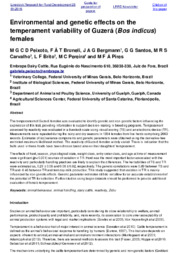Environmental and genetic effects on the temperament variability of Guzerá (Bos indicus) females.
Environmental and genetic effects on the temperament variability of Guzerá (Bos indicus) females.
Autoria: PEIXOTO, M. G. C. D.; BRUNELI, F. A. T.; BERGMANN, J. A. G.; SANTOS, G. G. dos; CARVALHO, M. R. S.; BRITO, L. F.; PEREIRA, M. C.; PIRES, M. de F. A.
Resumo: The temperament of Guzerá females was evaluated to identify genetic and non-genetic factors influencing the expression of this trait, providing information to support decision-making in breeding programs. Temperament assessed by reactivity was evaluated in a livestock scale using visual scoring (TS) and an electronic device (TR). Measurements were repeated during the rainy and dry seasons in 1354 females from five herds comprising 2663 records. Estimates of (co)variance components and genetic parameters were obtained using the derivative-free restricted maximum likelihood method. The reactivity of Guzerá females widely varied. There is indication that the bulls used in these herds have been chosen based also on their daughters? temperament. The effects of herd, season, physiological state, weight class, entry order class, and age at time of measurement were significant (p< 0.001) sources of variation in TR. Herd was the most important factor associated with the reactivity and particularly handling practices are likely to explain the differences. The heritabilities of TS and TR were estimated as, 0.29 ± 0.08 and 0.06 ± 0.02, respectively. The genetic correlations were 0.89 between TS and TR and -0.46 between TR and test-day milk production. This study suggested that variation in TR is mainly influenced by non-genetic effects. Genetic parameter estimates still do not allow for an accurate establishment of the potential of TR for selection. Further studies using larger datasets should be performed to provide additional evaluation of female temperament.
Ano de publicação: 2016
Tipo de publicação: Artigo de periódico
Unidade: Embrapa Gado de Leite
Palavras-chave: Animal behaviour, Reactivity, animal handling, dairy cattle, zebu
Observações
1 - Por padrão são exibidas publicações dos últimos 20 anos. Para encontrar publicações mais antigas, configure o filtro ano de publicação, colocando o ano a partir do qual você deseja encontrar publicações. O filtro está na coluna da esquerda na busca acima.
2 - Para ler algumas publicações da Embrapa (apenas as que estão em formato ePub), é necessário ter, no celular ou computador, um desses softwares gratuitos. Sistemas Android: Google Play Livros; IOS: iBooks; Windows e Linux: software Calibre.
Acesse outras publicações
Acesse a Base de Dados da Pesquisa Agropecuária (BDPA) para consultar o acervo completo das bibliotecas da Embrapa.

